Yes, all profits from forex trading in South Africa are taxable. Navigating the rules for forex tax in South Africa can seem daunting, but it’s a critical part of a successful trading career. Whether you’re a day trader or a long-term investor using an online forex broker, the South African Revenue Service (SARS) requires you to declare your earnings. This guide will break down everything for 2025: how your profits are classified and taxed, your obligations as a provisional taxpayer, what expenses you can deduct, and how to stay compliant to avoid penalties.

Key Takeaways
- Profits are Taxable: All forex trading profits in South Africa are subject to tax. How they are taxed depends on whether you are considered a trader (income tax) or an investor (capital gains tax).
- Trader vs. Investor: Frequent, speculative traders are typically taxed on income at their marginal rate (18% to 45%). Long-term, less frequent investors may be taxed under Capital Gains Tax (CGT), with an effective rate of up to 18%.
- Provisional Tax is Mandatory: If you earn forex income outside of a regular salary (PAYE), you must register with SARS as a provisional taxpayer. This involves making bi-annual payments to avoid penalties.
- Deductions are Key: You can legally reduce your taxable income by deducting legitimate trading-related expenses. This includes software, hardware, internet costs, and educational courses.
- Record-Keeping is Non-Negotiable: Meticulous records of all trades (profits and losses), statements from your broker, and receipts for expenses are essential for accurate filing and for substantiating your claims if SARS audits you.
- Declare All Income: Your obligation to declare profits for forex tax in South Africa applies regardless of whether your broker is local or international.
Disclaimer: The information provided in this article is for educational and informational purposes only and should not be construed as financial or tax advice. The rules surrounding forex tax in South Africa are complex and subject to change. We are not tax professionals. You should consult with a qualified and registered tax practitioner to understand your specific obligations to the South African Revenue Service (SARS) and to ensure full compliance with the law.
How Forex Profits Are Taxed
Understanding how the South African Revenue Service (SARS) views your trading profits is the first and most critical step. From my years in the market, I’ve seen many new traders get this wrong and face complications later. The core issue isn’t if you pay tax, but how that tax is calculated. It all boils down to your trading intention and frequency, which determines whether your gains are treated as business income or as capital gains. Getting this classification right is fundamental to managing your forex tax in South Africa correctly.
SARS Classification: Trader or Investor?
The distinction between being a “trader” and an “investor” is probably the most debated topic when it comes to forex tax in South Africa. There isn’t a single, rigid definition from SARS, but it’s determined by your “intention” and trading patterns. This is where your activity speaks for itself.
You are likely a trader if:
- You trade frequently: This means you are opening and closing positions daily or several times a week. Your goal is to profit from short-term market fluctuations.
- Your intention is speculative: You’re not holding currencies as a long-term asset but are actively seeking to make a profit from buying and selling. This is the very definition of most retail forex trading.
- You have a systematic, business-like approach: You use specific strategies, dedicate significant time to your trading, and operate like a business.
In this scenario, SARS will almost certainly classify your profits as income. This is the default and safest assumption for anyone actively trading forex.
You might be an investor if:
- You hold positions for a long time: We’re talking months or even years. Your goal is capital appreciation over a significant period, not quick profits.
- Your trades are infrequent: You might only make a handful of trades per year.
- The income is a passive pursuit: It’s not your primary activity or run with the intensity of a business.
Frankly, for 99% of people reading this guide, the “trader” classification will apply. It’s rare for a retail forex participant to fit the “investor” profile. Assuming you’re an investor when you’re a day trader is a red flag for SARS and could lead to audits and penalties. It is always best to be prudent and assume the more stringent classification applies to you when considering your forex trading income tax South Africa obligations.
Income Tax vs. Capital Gains Tax
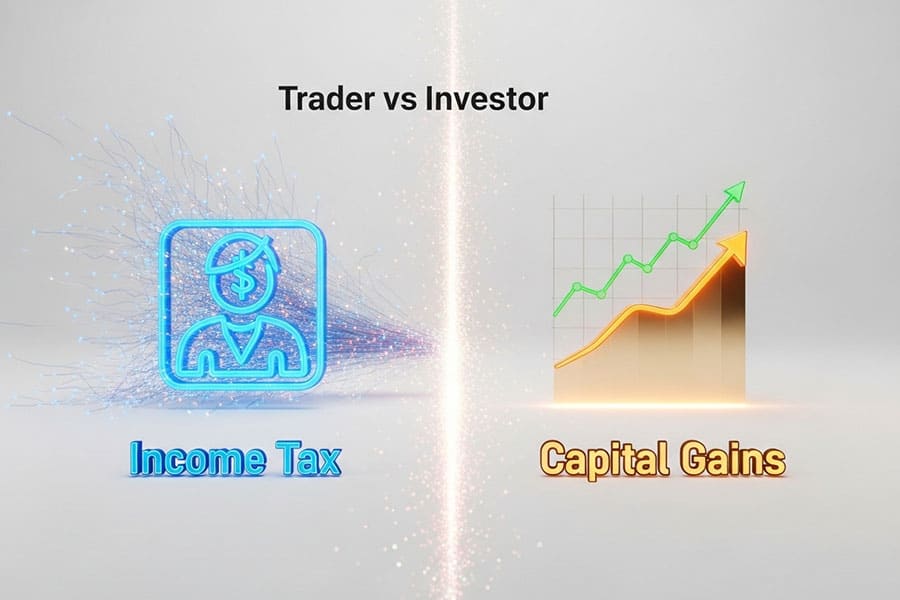
Once your classification is clear, the tax treatment follows. This directly impacts the rate you’ll pay and how losses are handled.
As a Trader (Income Tax):
Your net profit (gains minus losses and deductible expenses) is added to your other taxable income for the year (like a salary, if you have one). This total amount is then taxed at your personal marginal tax rate. For the 2024/2025 tax year, these rates are progressive, meaning the more you earn, the higher the percentage of tax you pay on the next slice of income.
Here are the personal income tax brackets for the tax year ending 28 February 2025:
| Taxable Income (R) | Rate of Tax (R) |
| 1 – 237,100 | 18% of taxable income |
| 237,101 – 370,500 | 42,678 + 26% of taxable income above 237,100 |
| 370,501 – 512,800 | 77,362 + 31% of taxable income above 370,500 |
| 512,801 – 673,000 | 121,475 + 36% of taxable income above 512,800 |
| 673,001 – 857,900 | 179,147 + 39% of taxable income above 673,000 |
| 857,901 – 1,817,000 | 251,258 + 41% of taxable income above 857,900 |
| 1,817,001 and above | 644,489 + 45% of taxable income above 1,817,000 |
The major advantage here is that your trading losses and expenses are fully deductible against your trading profits in the same year. If you have a net loss, it may be ring-fenced or, in some cases, used to offset other income, though this is complex and requires professional advice.
As an Investor (Capital Gains Tax – CGT):
If you fall into the rare “investor” category, your profits are subject to Capital Gains Tax (CGT). In South Africa, you don’t pay tax on the full capital gain. Instead, a portion of the net capital gain (after the annual exclusion) is included in your taxable income and then taxed at your marginal rate.
- Annual Exclusion: For individuals, the first R40,000 of capital gains is exempt from tax each year.
- Inclusion Rate: After the exclusion, 40% of the remaining net capital gain is added to your taxable income.
This means the effective tax rate on capital gains is much lower. For someone in the highest tax bracket (45%), the effective CGT rate is 18% (40% inclusion rate x 45% marginal rate). The downside is that capital losses can only be offset against capital gains, not against your regular income.
Tax Rates for 2025 Explained
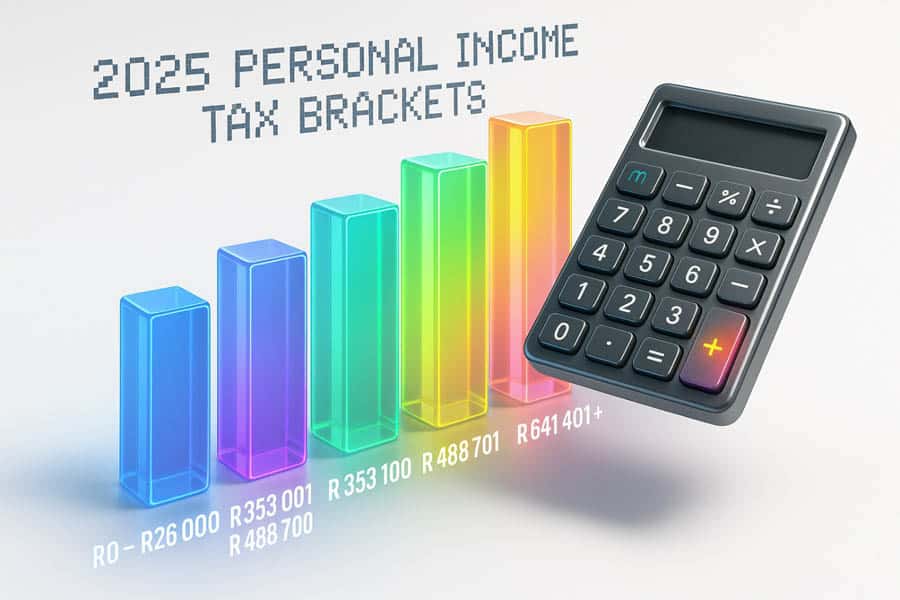
Let’s make this practical. Here’s how you would approach calculating your forex tax in South Africa as a trader.
Example 1: A Part-Time Trader
- Salary from regular job: R300,000 per year.
- Net Forex Profit: R80,000 (after deducting losses and R10,000 in expenses).
Calculation:
- Total Taxable Income: R300,000 (salary) + R80,000 (forex profit) = R380,500.
- Tax Bracket: This income falls into the R370,501 – R512,800 bracket.
- Tax Calculation: The tax is R77,362 + 31% of the amount above R370,500.
- Amount above threshold: R380,500 – R370,500 = R10,000.
- Additional Tax: 31% of R10,000 = R3,100.
- Total Tax Due (before rebates): R77,362 + R3,100 = R80,462.
Without the forex profit, the tax on R300,000 would have been R42,678 + 26% of (R300,000 – R237,100) = R59,032. The additional R21,430 in tax is a direct result of the forex trading income. This is a crucial aspect of managing your forex trading income tax South Africa.
Example 2: A Full-Time Trader
- Net Forex Profit: R600,000 for the year.
- No other income.
Calculation:
- Total Taxable Income: R600,000.
- Tax Bracket: This income falls into the R512,801 – R673,000 bracket.
- Tax Calculation: The tax is R121,475 + 36% of the amount above R512,800.
- Amount above threshold: R600,000 – R512,800 = R87,200.
- Additional Tax: 36% of R87,200 = R31,392.
- Total Tax Due (before rebates): R121,475 + R31,392 = R152,867.
This demonstrates the high importance of diligent expense tracking and understanding the tax implications. A significant portion of your hard-earned profit is owed to SARS, and planning for it is not optional.
Another option some traders explore is trading through a registered company. A company pays a flat corporate income tax rate (currently 27% for the 2024/2025 year). This can be advantageous if your personal marginal tax rate is much higher, but it comes with its own set of administrative costs and complexities, like director salaries and dividends tax. It’s a strategic decision that absolutely requires consultation with a tax professional.
Must-Know Tax Obligations
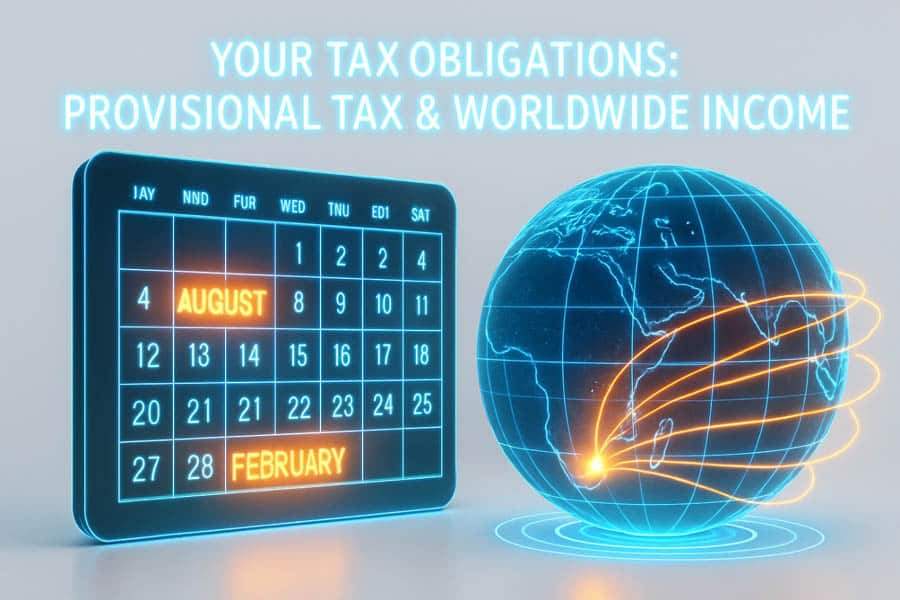
Knowing the tax rates is one thing; meeting your compliance duties is another. This is where many traders, full of enthusiasm for the markets, tend to drop the ball. From my experience, setting up your compliance framework from day one is just as important as your trading strategy. The South African Revenue Service (SARS) forex tax system is built on self-declaration, and the responsibility to get it right falls squarely on you. Failing to meet these obligations can turn profits into penalties very quickly.
Registering as a Provisional Taxpayer
This is arguably the most critical and overlooked obligation. If you earn income that isn’t subject to standard employee tax (PAYE), you are legally required to register as a provisional taxpayer with SARS. Since your forex profits from a broker don’t have tax deducted at the source, this applies to virtually every single forex trader in South Africa.
What is Provisional Tax?
Provisional tax is not a separate tax. It’s a mechanism to pay your income tax liability in advance, throughout the tax year, ensuring you don’t end up with a massive, unmanageable tax bill after filing your annual return. It involves estimating your total taxable income for the year (from all sources) and making two payments based on that estimate. A third, optional payment can be made to top up if your initial estimates were too low.
Failing to register and pay is a serious offence. SARS will levy significant penalties for under-estimation and late payments. The system is designed to keep you paying as you earn. Therefore, becoming a provisional tax forex traders South Africa is not a choice, but a legal requirement.
The Payment Deadlines:
- First Payment (IRP6): Due by the end of August each year. This covers the first six months of the tax year (March to August).
- Second Payment (IRP6): Due by the end of February each year. This covers the full tax year (March to February).
- Third Payment (Optional): Due by the end of September, after the tax year has closed. This is a voluntary payment to avoid interest charges if the first two payments were insufficient.
What Needs to Be Declared?
The rule is simple and absolute: you must declare all your worldwide income to SARS if you are a South African tax resident. This has a direct implication for forex traders.
Local vs. Offshore Brokers:
It makes zero difference to your tax liability whether you use a locally regulated broker or an international one. Many traders mistakenly believe that because their funds are with an offshore broker, SARS won’t know about their profits. This is a dangerous and outdated assumption.
Under the international Common Reporting Standard (CRS), financial institutions worldwide automatically exchange information with tax authorities to combat tax evasion. Over 100 countries, including popular jurisdictions for brokers, are signatories. SARS is actively receiving data on the financial accounts held by South African residents abroad.
So, that profit sitting in your offshore trading account is not hidden. When you eventually bring that money into South Africa, or even if you don’t, SARS has the means to find out about it. The question is not if they will find out, but when. Declaring everything transparently is the only correct and safe approach to handling your forex tax in South Africa.
You must declare the total profit in South African Rands (ZAR). This means you need to convert your profits, which are often in USD, EUR, or GBP, into ZAR. You can use the average exchange rate for the tax year, or the spot rate on the day of each transaction (withdrawal/profit realization), but consistency is key. SARS publishes official average exchange rate tables that are best practice to use.
2025 Reporting Deadlines & Forms
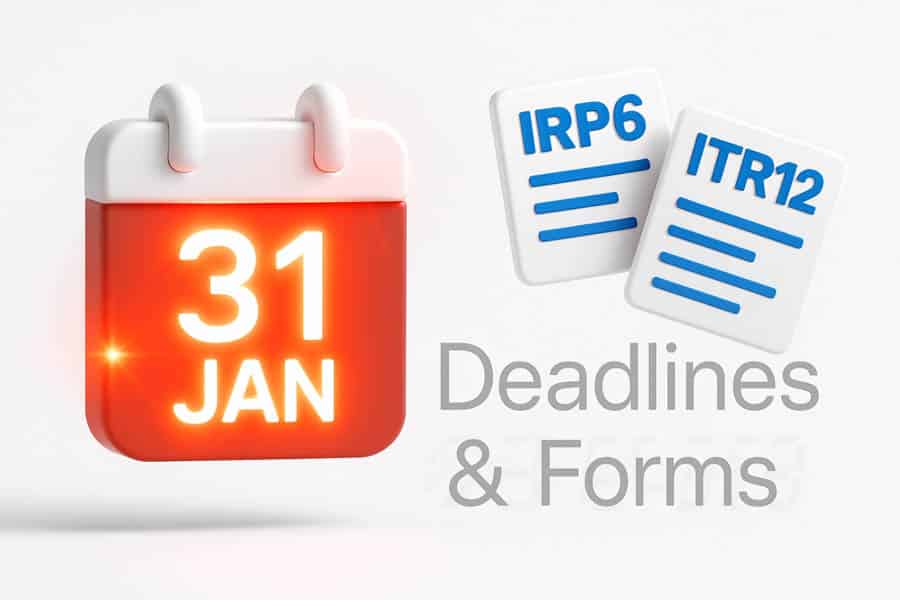
Staying compliant means knowing your dates and documents. Missing a deadline can result in immediate penalties.
- Tax Year: The South African tax year runs from 1 March to 28/29 February of the following year.
- Provisional Tax Deadlines: As mentioned, the first payment is due by 31 August 2024 and the second by 28 February 2025 for the 2025 tax year.
- Annual Tax Filing Season (Filing Season): This is when you file your final income tax return, reconciling your provisional payments with your actual income.
- Non-provisional taxpayers (salaried employees): Usually runs from July to October/November.
- Provisional Taxpayers: You have a longer window, typically from July until the end of January of the following year. For the 2025 tax year, the deadline will likely be around 31 January 2026.
Key Forms:
- IRP6: This is the form you use to make your provisional tax payments. It’s filed electronically via SARS eFiling.
- ITR12: This is your annual income tax return. All your income sources, including your net forex profits, are declared on this form. You will input your trading income under the relevant section for local or foreign income.
Keeping track of these dates is vital. I recommend setting calendar reminders well in advance. Late filing of your ITR12 can lead to administrative penalties being charged monthly until you file. This is an unnecessary cost that is easily avoided with a bit of organization.
Practical Strategies to Save
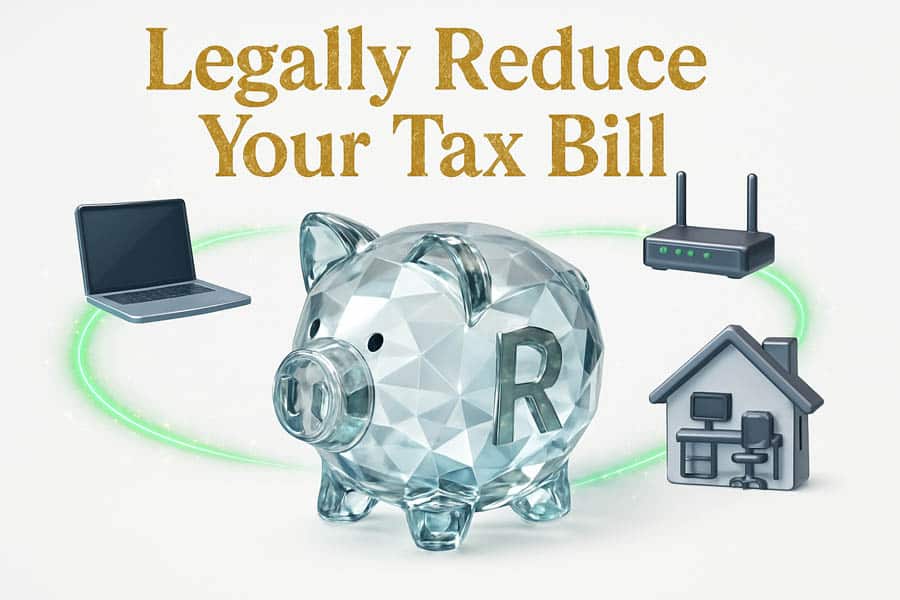
Paying tax is a legal duty, but paying more than you are legally required to is a financial mistake. As a trader, your goal is to maximize net profit, and that includes legally minimizing your tax burden. Over the years, I’ve learned that effective tax management is as much a part of a successful trading business as risk management. There are several legitimate strategies you can employ to reduce your final bill for forex tax in South Africa. These strategies revolve around meticulous record-keeping and understanding what SARS considers a valid business expense.
Top Deductions Forex Traders Can Claim
If you are taxed as a trader (income tax), you are effectively running a business, and you can deduct expenses incurred “in the production of income.” This is a powerful tool. Every Rand you can legitimately claim as an expense is a Rand removed from your taxable profit.
Here is a list of common deductible expenses for forex traders:
- Bank Charges: Fees associated with your trading accounts, including wire transfer fees for funding or withdrawing from your broker.
- Computer Equipment: The depreciation (wear and tear allowance) on your laptop, PC, and monitors used for trading. You generally can’t deduct the full cost upfront but can claim a portion over a few years (e.g., three years for computer equipment).
- Data and Software Fees: Subscriptions to charting software (like TradingView), news feeds, analytical tools, or Expert Advisors (EAs).
- Educational Costs: The cost of trading courses, seminars, webinars, or books that are intended to improve your trading skills and generate more income. The expense must be directly related to your existing trading business, not to start a new one.
- Internet and Phone Costs: A percentage of your home internet and mobile phone bill that can be reasonably attributed to your trading activities. You can’t claim 100% unless you have a dedicated line purely for trading.
- Home Office Expenses: This is one of the most powerful but also most scrutinized deductions. If you have a dedicated space in your home used exclusively and regularly for trading, you can claim a portion of your home’s expenses, such as rent/interest on bond, electricity, and repairs. The claimable portion is calculated based on the square meterage of your office relative to the total size of your home. The rules here are very strict.
- Tax Practitioner Fees: The fees you pay to an accountant or tax specialist to help you prepare and file your returns are fully deductible.
Understanding and claiming these is a crucial part of managing your forex trading income tax South Africa liability.
Smart Expense Tracking Tips
Claiming deductions is impossible without proof. “If you can’t prove it, you can’t claim it” is the golden rule when dealing with SARS. From personal experience, trying to piece together a year’s worth of expenses in a panic a week before the filing deadline is a recipe for disaster. You will forget things and miss out on valuable deductions.
Here’s a system that works:
- Get a Separate Bank Account: Open a dedicated bank account for all your trading-related income and expenses. Fund your broker from here, pay for your subscriptions from here, and withdraw your profits here. This creates a clean, easily auditable trail.
- Use a Spreadsheet or App: From day one, log every single expense. Create a simple spreadsheet with columns for Date, Description, Category (e.g., Software, Internet), and Amount. Update it weekly.
- Keep Digital and Physical Copies: Scan every single invoice and receipt and save them in a dedicated cloud folder (e.g., Google Drive, Dropbox) organized by month. Also, keep the physical copies in a file. You are required by law to keep records for at least five years.
- Document Your Home Office Calculation: If you claim a home office, have your calculation ready. Measure your office, measure your home, and keep a record of the calculation along with your rental agreement or bond statement and utility bills.
This level of organization not only maximizes your deductions but also gives you immense peace of mind. If SARS ever sends a request for information, you’ll be able to respond quickly and confidently. This discipline separates professional traders from hobbyists.
Losses: How and When to Offset
Losses are an inevitable part of trading. The good news is that under the income tax classification, your trading losses can be used to your advantage when it comes to your forex tax in South Africa.
The basic principle is that you offset your total trading losses against your total trading gains within the same tax year. You are only taxed on the net profit.
Example:
- Total Forex Gains: R250,000
- Total Forex Losses: R150,000
- Deductible Expenses: R20,000
Net Profit Calculation: R250,000 (Gains) – R150,000 (Losses) – R20,000 (Expenses) = R80,000 (Taxable Income).
You would declare R80,000 as your trading income, not the full R250,000 in gains. This is why keeping a detailed log of every single trade, win or lose, is absolutely critical. Your broker statements are the primary evidence for this.
What if you have a net loss for the year?
If your losses and expenses exceed your gains, you have an “assessed loss.” For example, if your gains were R150,000 but your losses were R200,000, you have a net loss of R50,000. This assessed loss can typically be carried forward to the next tax year to offset future trading profits. So, if you make a R100,000 profit the following year, you could use your R50,000 assessed loss from the prior year to reduce your taxable income to just R50,000.
However, be aware of “ring-fencing” rules (Section 20A of the Income Tax Act). If you are a high-income individual and your trading is considered a secondary “suspect trade” that consistently makes losses, SARS may prevent you from offsetting that loss against your primary income (like a salary). This is a complex area where professional advice is essential. The obligation of a provisional tax forex traders South Africa includes getting these calculations right.
How to Stay Compliant with SARS
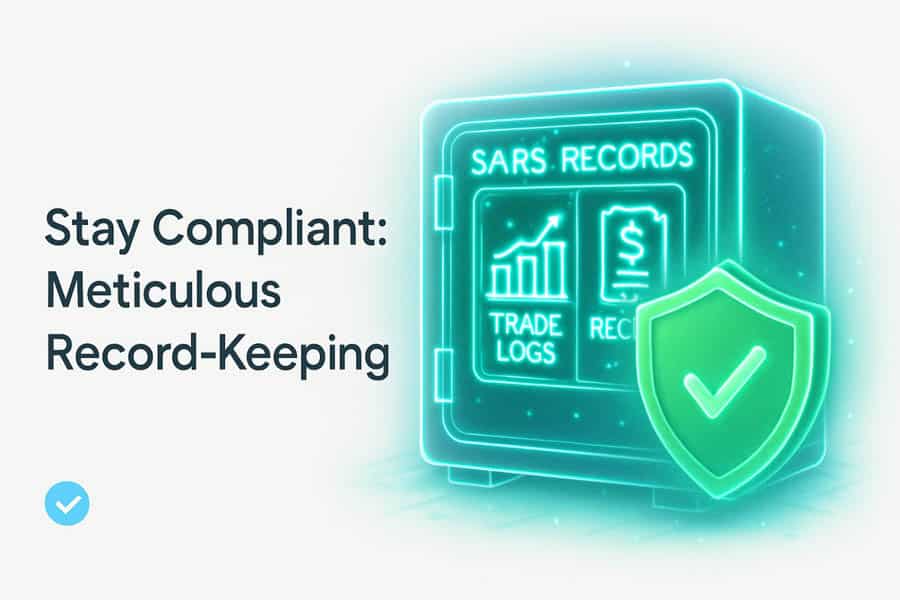
Compliance is the foundation of a sustainable trading career in South Africa. It’s not the most exciting part of trading, but it’s what ensures you can enjoy your profits without constantly looking over your shoulder. The approach of the South African Revenue Service (SARS) forex tax system has become increasingly data-driven and sophisticated. “Hoping for the best” is no longer a viable strategy. Building a robust system for record-keeping and staying informed about tax law changes will protect you from penalties and stress.
Best Practices for Record-Keeping
As I’ve stressed before, your records are your defense. In the event of a query or audit from SARS, the burden of proof is on you, the taxpayer. Immaculate records make this process smooth and painless. Poor records can lead to SARS disallowing your expense claims or making their own, often unfavorable, estimations of your income.
Here’s a checklist for best-in-class record-keeping:
- Comprehensive Trade Log: While your broker provides statements, keeping your own summary log is a good practice. This should detail the instrument, open date, close date, profit/loss in the original currency, and the converted ZAR amount.
- Broker Statements: Download and save your monthly or annual statements from your forex broker without fail. These are your primary source documents for proving your gains and losses.
- Proof of All Expenses: Every single invoice and receipt for every deduction you plan to claim. For a home office, this includes your bond statements, utility bills, and the calculation of your claimable percentage.
- Bank Statements: Statements from your dedicated trading bank account that clearly show funds moving to and from your broker, and payments for expenses.
- ZAR Conversion Records: Keep a note of the exchange rates you used to convert your profits/losses to Rands. Using the official SARS annual average exchange rates is the safest bet and is easily justifiable.
- Storage: Keep these records digitally in a secure cloud service and maintain physical copies. Remember the five-year rule – you must be able to produce these documents for at least five years after the tax year has ended.
This level of diligence in managing your forex tax in South Africa documentation is what separates amateurs from professionals.
Latest Tax Law Changes in 2025
The tax landscape is not static. The Minister of Finance announces changes to tax laws and rates every year in the February Budget Speech. While the core principles of what constitutes income usually remain the same, tax brackets, rebates, and specific rules can and do change.
For the 2025 tax year (1 March 2024 – 28 February 2025), a key point from the recent budget is that there were no major inflationary adjustments to the personal income tax brackets or rebates. This phenomenon, known as “bracket creep,” means that if your income increases with inflation, you might be pushed into a higher tax bracket, effectively increasing your tax burden. For a trader, this means your profit targets might need to be adjusted to account for this.
Furthermore, SARS’s focus on international data sharing and wealthy individuals continues to intensify. The message from the revenue service is clear: they are enhancing their technological capabilities to detect non-compliance. Staying updated is crucial. A good practice is to review the highlights from the Budget Speech each February and consult with your tax practitioner about any changes that might affect your forex trading income tax South Africa liability. Subscribing to newsletters from major tax and accounting firms in South Africa is a great way to stay informed for free.
Always assume that compliance requirements for forex tax in South Africa will become stricter, not more lenient, over time. Building good habits now is an investment in your future.
Your Professional Trading Partner: Opofinance
Take your trading to the next level with Opofinance, an ASIC-regulated broker designed for serious traders. Benefit from a suite of powerful tools and secure trading conditions.
- Advanced Trading Platforms: Choose from MT4, MT5, cTrader, and the intuitive OpoTrade platform.
- Innovative AI Tools: Leverage our AI Market Analyzer, AI Coach, and 24/7 AI Support to gain a competitive edge.
- Social & Prop Trading: Explore community-driven trading and get access to funded accounts.
- Secure & Flexible Transactions: Enjoy safe and convenient deposits and withdrawals, including crypto payments with zero fees.
Discover a Smarter Way to Trade with Opofinance Today!
Conclusion
Navigating the world of forex tax in South Africa is an essential, non-negotiable part of being a trader. While the rules may seem complex, they boil down to a few core principles: your profits are taxable as income, you must register as a provisional taxpayer, and you must keep meticulous records. By embracing these obligations with a professional mindset, you can legally minimize your tax liability through deductions and ensure full compliance, protecting your hard-earned capital from penalties and giving you the peace of mind to focus on the markets.
How do I report forex profits to SARS?
You report forex profits on your annual Income Tax Return (ITR12). You must first be registered as a provisional taxpayer and make bi-annual payments (using an IRP6 form). On the ITR12, you will declare the net profit (gains minus losses and expenses) in the relevant income section.
What are the penalties for not declaring forex gains?
Penalties can be severe. They include late payment penalties (up to 10% of the tax due), late filing penalties (charged monthly), and understatement penalties which can be up to 200% of the tax shortfall, depending on your behaviour. Interest will also be charged on any outstanding amount.
Is there a tax-free threshold for forex trading in SA?
For traders whose profits are taxed as income, there is no specific “forex threshold.” The profit is added to other income and is subject to the normal annual tax threshold (R95,750 for under 65s in the 2025 tax year). If profits are treated as a capital gain (which is rare), the first R40,000 annual exclusion for capital gains would apply.
Can I deduct my trading losses from my salary income?
This is complex. Generally, losses from a trade can only be offset against profits from the same trade. In specific circumstances, you might be able to offset a net trading loss against other income, but SARS has strict “ring-fencing” rules to prevent this, especially if trading is not your primary business. You must seek professional tax advice on this.
Do I pay tax if my money is still with an offshore broker?
Yes. If you are a South African tax resident, you are taxed on your worldwide income. The tax liability arises when the profit is realized (i.e., when you close a profitable trade), not when the money is brought back into South Africa. You must declare the profit in the tax year it was made.







